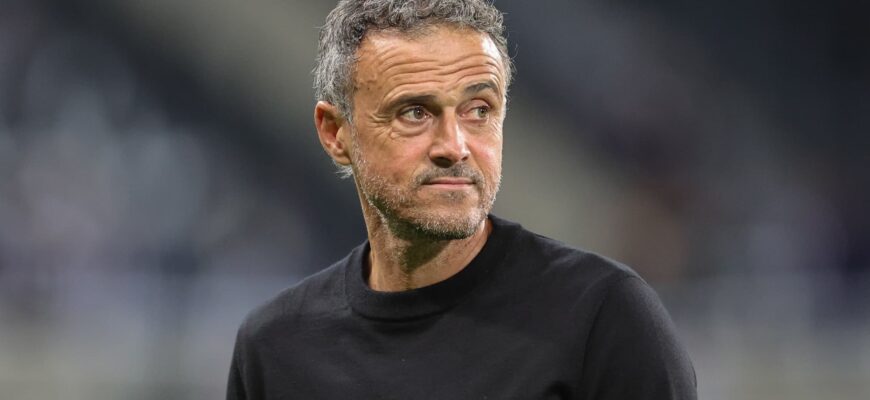In a sport often defined by the fierce energy of the touchline, Paris Saint-Germain`s head coach, Luis Enrique, is orchestrating a subtle revolution from an unexpected vantage point: the stands. This isn`t a punitive exile, but a calculated tactical maneuver designed to grant an unparalleled perspective on the beautiful game.
Football managers are typically figures of intense, often theatrical, presence on the sidelines. Their animated gestures, impassioned shouts, and sometimes outright theatrics are as much a part of the match-day experience as the players themselves. So, when Luis Enrique opted to begin PSG`s recent 2-0 victory against Lens from the press box, it raised more than a few eyebrows. Was it a protest? A bizarre tactical ploy? As it turns out, it was a deliberate, strategic choice, and one that the club is now officially endorsing.
The Tactical Zenith: Why the Stands?
Enrique`s philosophy is disarmingly simple, yet profoundly insightful: the touchline offers an incredibly narrow, ground-level view, akin to seeing only the trees, not the forest. From a higher perch in the stands, the entire tactical tapestry of the match unfolds with greater clarity. He believes this “bird`s eye view” allows for a more comprehensive understanding of player positioning, team shape, and the spatial dynamics that dictate success or failure on the pitch. It`s about seeing the *patterns*, not just the individual movements.
This isn`t a novel concept in sports analysis; many top-tier performance analysts routinely watch games from elevated positions. However, for a head coach to *personally* adopt this perspective during the live action is remarkably unconventional. “One must truly appreciate the audacity,” some might muse, “to trade the immediate, visceral connection of the dugout for the cerebral calm of the spectator seats.” It`s a testament to a coach confident enough to defy convention for perceived strategic gain.
PSG`s Unconventional Accommodation: A Dedicated Perch
Far from discouraging this unorthodox approach, Paris Saint-Germain is fully embracing it. Reports indicate the club is set to construct a dedicated area within the Parc des Princes stands specifically for Luis Enrique. This isn`t merely a seat in the cheap seats; one can envision a bespoke tactical command center, perhaps with enhanced communication equipment and an unobstructed view, designed to optimize his unique method of observation. It`s a significant investment, underscoring PSG`s commitment to supporting their manager`s innovative, albeit peculiar, tactical vision.
This commitment highlights a fascinating aspect of modern football management: the increasing willingness to explore non-traditional methods to gain a competitive edge. When a club of PSG`s stature is willing to build a specialized “luxury box” for tactical observation, it signals a shift in thinking that could influence others.
The Man on the Ground: Rafel Pol`s Pivotal Role
Of course, a football match still requires an immediate presence on the touchline to convey instructions, make substitutions, and manage the psychological ebb and flow. This is where assistant coach Rafel Pol steps into a critical role. During Luis Enrique`s elevated observations, Pol assumes command in the technical area, acting as the direct conduit between the strategic insights from above and the on-field execution below. This arrangement necessitates immense trust and seamless communication between the two coaches – a tactical tandem operating on different planes, yet perfectly synchronized.
Pol`s ability to interpret and transmit Enrique`s refined instructions during the interval, after the coach descends from his tactical perch, becomes paramount. It`s a sophisticated “observe-analyze-delegate” loop, demanding a highly cohesive coaching staff.
The Unwritten Rules of the Game: Le Classique`s Firm Stance
While PSG is rolling out the red carpet (or perhaps, constructing the skybox) for Enrique`s aerial ambitions, not all opponents are so accommodating. As PSG prepares for the highly anticipated “Le Classique” against Marseille, reports suggest that no such requests for a dedicated coaching position in the stands will be entertained. This highlights the practical limitations and differing philosophies across clubs and venues.
It also injects a compelling element of `home advantage` beyond mere crowd noise. While at Parc des Princes, Enrique can leverage his unique perspective; away from home, he must revert to the conventional touchline role. This contrast could subtly influence his tactical approach depending on the venue, adding another layer of intrigue to PSG`s season.
A Glimpse into the Future of Coaching?
Luis Enrique`s decision to manage from the stands is more than just a personal quirk; it`s a fascinating experiment in football tactics. In an era where every marginal gain is sought after, a coach leveraging a different physical perspective for enhanced analytical clarity is certainly food for thought. Will this become a trend? Or will it remain a unique footnote in the storied career of a manager known for his innovative approaches?
Regardless, it presents a compelling case study on the evolving nature of football management. PSG, under Luis Enrique, is not just playing the game; they`re questioning how it`s observed, analyzed, and ultimately, won. And sometimes, it seems, victory comes from having the best seat in the house.








